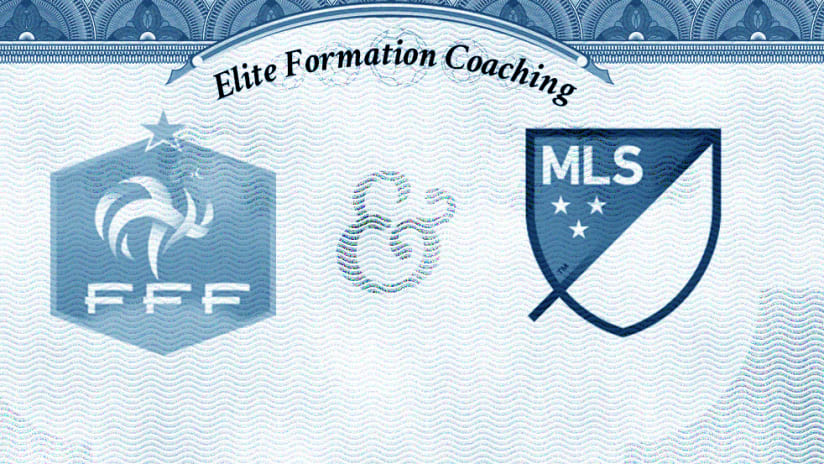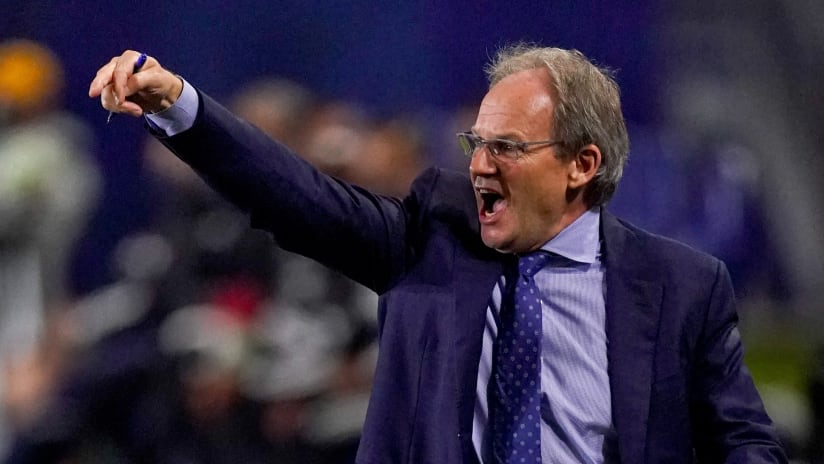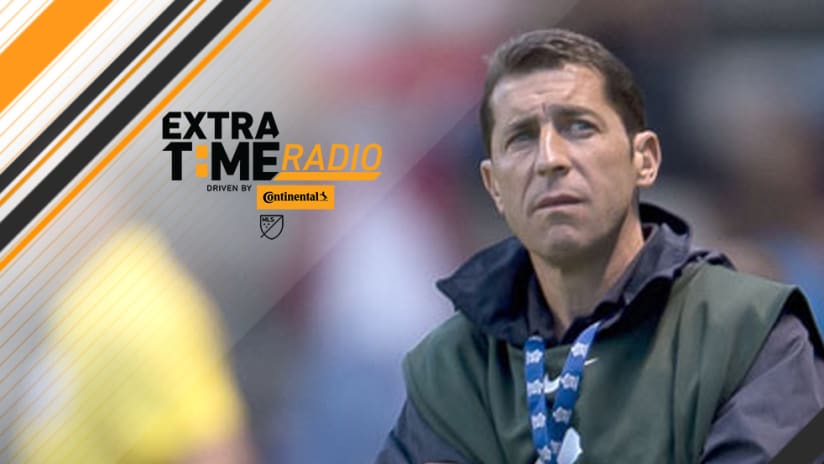Tony Annan is working his way through his new coaching terminology with all the grace he can muster. It is not an easy thing.
The Atlanta United academy manager and Under-16 coach has spent so much time immersed in a new coaching course over the past year – a product of a partnership between MLS and the French Football Federation (FFF) – that swimming in his head are phrases and terms and those infernal stoplights. Each time the coaches convened for one of the course’s five week-long residency intensives, they were graded on their performance each day by a tiered stoplight system; green for good, yellow for passing and red for poor. Every coach feared red days. Mixed in with a year’s worth of learnings, Annan is trying to put those experiences into one simple, easy-to-digest package.
Then he stops, tripped again on words as big as houses.
“I’m trying to describe it as simple as I can,” Annan says through a chuckle. “It’s fairly complicated.”
For the last 12 months, Annan and 20 of his MLS academy coaching brethren have been consumed by the overwhelming flood of the French Football Federation’s labor-intensive academy course it began in partnership with MLS more than three years ago. Titled the Elite Formation Coaching License (EFCL), its introduction in the US after wild success in France was the brainchild of a March 2012 meeting in Paris between MLS executive Todd Durbin and a small collection of French development gurus.
The question on the table was how to increase the viability, sustainability and quality of MLS’s fledgling academies. The answer from the Frenchmen, at least in part, came back with an emphatic reexamination of the coaching education system at the very top of the youth game.
The EFCL badge, introduced a year after those initial meetings and independent to every other badge process in the United States, was their answer.
A Master's Degree in Soccer
In partnership with instructors provided by the FFF, MLS made the EFCL course available to its academy heads and coaches for the first time in 2013. It developed into one of the most sought-after coaching rubrics in the world after it became a mainstay in French soccer, so much so that it’s required by the FFF of at least one coach in each of the nation’s professional academies today.
The second round of MLS coaches to take it, 21 in all from each MLS academy, began the course in September 2015, and after it was shortened to a 12-month run, it’ll produce its second group of graduates this month.
After the first graduating class in 2014, the course’s difficulty rapidly gained a reputation before the second group began. A few candidates dropped out, and not everyone who took the notoriously challenging final examination passed. As a standalone badge separate from every other coaching course in the country, many agreed it’s the hardest they’ve ever taken.
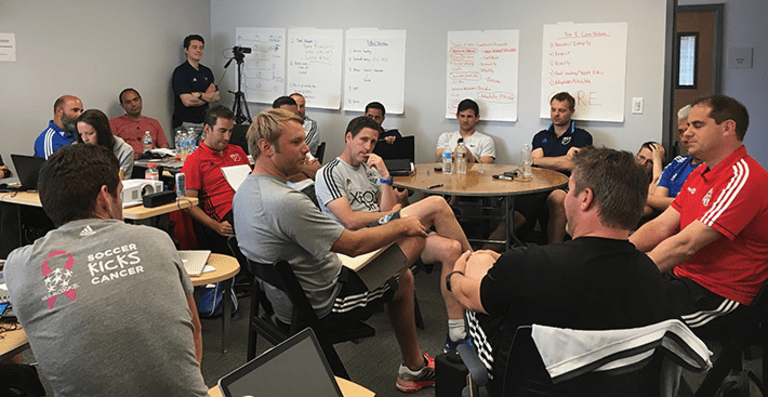
Coaches spent eight travel weeks split between different sites in the US and in France, where they’re put through their paces on things like technique, personal style, and the psychology of development. They also spent time embedded in different European clubs to learn their development methodology first hand, from Lyon to Feyenoord to Real Sociedad. In the interim, each candidate was tasked with documenting and notating their practices each day and submitting those for review.
When coaches say it’s a 52-week course, this grueling process akin in effort to a master’s degree is what they’re referencing.
“It wasn’t one of those things where you turn up, everyone passes and everyone has a lovely time,” said Sounders academy head Marc Nicholls, who passed the course in its first go-round. “It was really hard.”
The difficulty was only relevant insofar as it produced coaches capable of synthesizing some of the intricate coach-speak and distilled it into a teachable format for their players back home. And for the coaches who went through the course, those trees are already beginning to bear fruit.
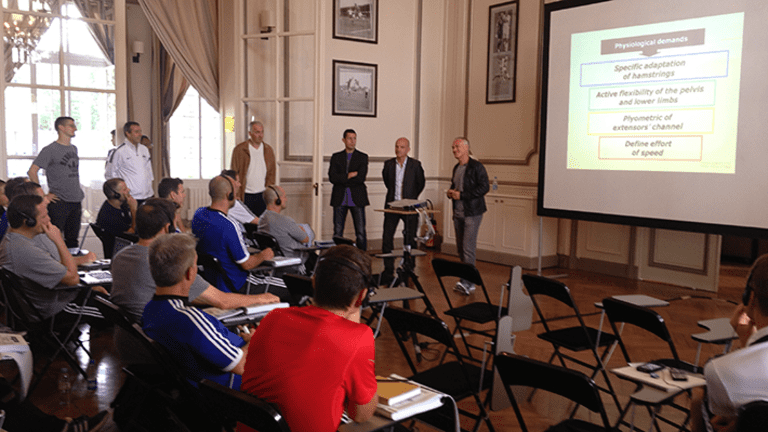
MLS academy coaches take in a session with French national team head coach and former World Cup champion Didier Deschamps.
From Classroom to Locker Room
For Rich Fagan, the head coach of the Vancouver Whitecaps’ U18 team and the second Whitecaps coach to go through the program, that process began in the first week of the most recent course. The EFCL’s 2015-16 cycle consisted of week-long modules hosted by Sporting Kansas City, the Philadelphia Union, New York Red Bulls, Atlanta United and then in France. During the first week, coaches watched French coaches work through training sessions with their residency players at the FFF’s national headquarters in Clairefontaine.
Fagan was mesmerized.
“I was so surprised with how calm and calculated the coaches were,” Fagan said. “At this point I wasn’t sure what to expect. They hadn’t spoken to us about any teaching methodology yet. I was just kind of seeing it for the first time. In that short period of time, what I saw those coaches get out of those kids without really having to say too much was unbelievable. That kind of set me on the pathway really for the last 12 months.”

MLS academy coaches and their French instructors pose with a Philadelphia Union academy squad.
If the reputation for coaching on this side of the Atlantic is more hands on and demonstrative, the EFCL challenged its candidates to step back and let their training breathe. Part of the course was introducing a beginning stage of each practice session they termed "guided discovery," something Annan affectionately calls “skillful silence” after introducing it into his practice sessions in Atlanta. The point is to back off the session and allow players to discover and puzzle out ways around on-field problems. The most a coach might do in this period is become a Socratic teacher, consistently questioning and never providing outright answers.
The next phase is taking those observed principles that need ironing and inserting those into a more technical exercise emphasizing repetition and verbal demand from the coaches. Finally, the session moves into small-sided exercises and then full-sided games pulling out those principles and rearranging them into game situations.
But the bedrock is built around that initial period of guided discovery, which can be a difficult shift in mindset for coaches versed in the American youth game.
“I was very controlling before the course,” Annan says. “I gave a lot of information, almost too much. I guess I was just really controlling of my session. The adjustment of pulling away and allowing them to discover is a completely different way. It was really difficult for me. I struggled with it at first, and so did my players. They were used to being given too much information, of me demanding all the time. But as you practice and do more of it, you really see the players taking ownership, thinking how to solve problems. You really see a different player coming out.”
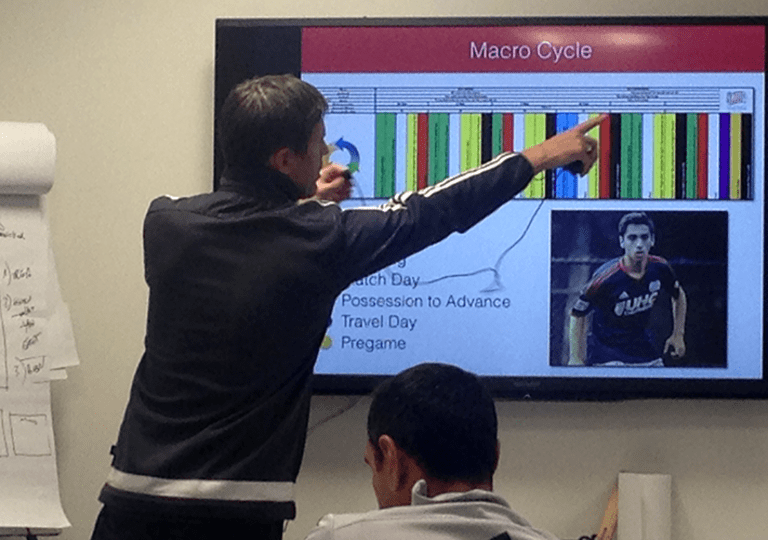
Fagan could relate.
“I was always pretty direct in my coaching style before,” he says. “I would be quite to the point, and I would let them know what my solution was. Now, I let them figure it out and ask them how they can fix it. It’s quite a change.”
On a tactical level, perhaps the course’s broadest aim is to cut down on over-coaching and hand some of the power back to the players. The way the FFF instructors saw it, there was simply too little figurative space between the sideline and the field. And that was robbing the players of some of their creativity and tactical acumen. Players improve by solving their own puzzles, not by watching the coaches drop in the pieces for them. That’s why they encourage each training session to begin with a period of guided discovery.
If a player is able to direct his own movement, solve his own problems and come up with his own solutions, the course asserts, then he’ll be a more tactically astute operator in the end.
“The main area we have to develop is the knowledge of the game,” Lipka says. “It’s the tactical aspect. Sometimes our kids are gifted but they don’t know what to do and how to do it. Technically I think we have good players, but sometimes individually or tactically they don’t know the basic of tactics. We think we can help.”
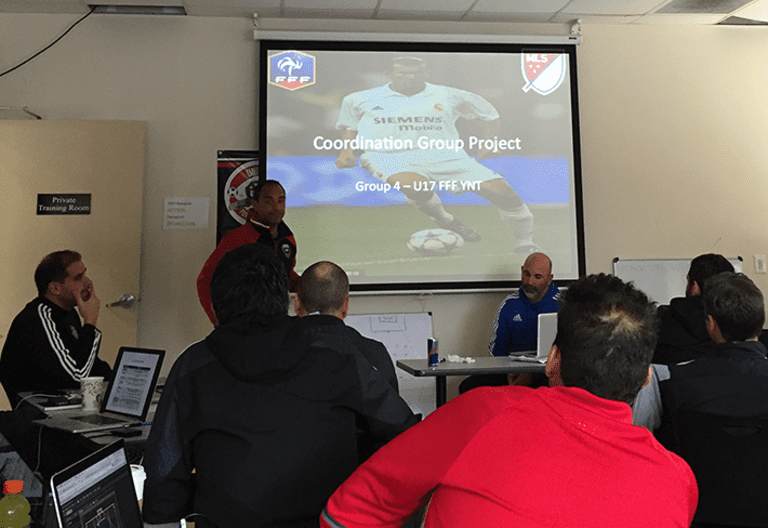
What Future Holds
The EFCL’s next steps are still being ironed out. Lipka hopes to institute a third round of the course for another group of 21 coaches in the near term. For now, he’s operating as a sort of full-time technical resource for MLS academy coaches looking to improve their practice sessions and squeeze as much potential from their players as possible.
Could MLS could some day take ownership of the course and administer something similar under its own singular banner? Never say never. For now, the program rolls on one coach at a time.
As for what that looks like on a practical, everyday basis, most coaches are preaching patience. Many have already seen returns from the course’s insistence on a more hands-off approach. That tends to engender more creatively inclined players, and if that’s where the course is driving MLS’s best academy players, then it will have done its job.
“It’s going to take time,” says LA Galaxy Under-18 coach Mike Muñoz, who took the course this year. “We’ve seen our kids drastically grow. And I would say that’s from the new methodology, but from other areas as well.
"It’s going to take time," he continued. "But you have to have the right club structure, too. Kids have to be given opportunities to train and play at the USL and first-team level. You could have the best talent in the world, but if they’re not given those chances, it’s not going to mean anything.”
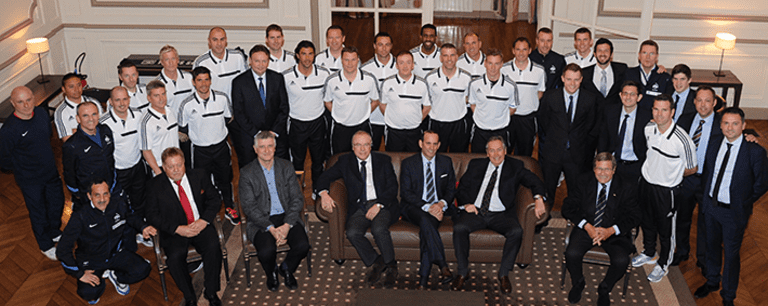
The first class of MLS academy coaches pose for a photo with MLS commissioner Don Garber and French coaching legend Gerard Houllier.

